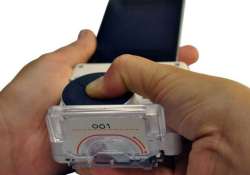This smartphone dongle can diagnose HIV in just 15 minutes
New Delhi: Researchers at Columbia University have developed a gadget that can be easily attached to a smartphone and it can reportedly diagnose cases of sexually transmitted diseases such as HIV and syphilis. The dongle

New Delhi: Researchers at Columbia University have developed a gadget that can be easily attached to a smartphone and it can reportedly diagnose cases of sexually transmitted diseases such as HIV and syphilis. The dongle can be attached to any smartphone or tablet through the audio jack, and the device's app reads the results, giving a diagnosis in about 15 minutes.
The app provides directions to the health care worker administering the test, as well as the results. At the moment, the app is available only for iOS version.Given the huge costs of typical diaognistic test, the new phone attachment comes as a potentially transformative breakthrough, mostly because of its low cost. While the typical diagnostic machinery used to detect HIV and syphilis costs more than $18,000, the new mobile “dongle” costs a mere $34 to manufacture.
A simple, mobile and cost-effective method to test for HIV and syphilis could mean a big difference in developing countries, particularly in helping to prevent mother-to-child transmission of HIV. “Our work shows that a full laboratory-quality immunoassay can be run on a smartphone accessory,” said Samuel Sia, the lead researcher, in a statement. “Coupling microfluidics with recent advances in consumer electronics can make certain lab-based diagnostics accessible to almost any population with access to smartphones. This kind of capability can transform how health care services are delivered around the world.”
A new study published in the Science Translational Medicine journal reported that the smartphone dongle was tested on 96 patients from Rwanda. The device had a 92-100 percent sensitivity rating when it came to correctly identifying infected patients, but its specificity rating was notably lower at 79-100 percent.
Though researchers are working on improving the accuracy, the dongle has got potential, as the data compared favorably to the results of the costly enzyme-linked immunosorbent assay (ELISA) test. Even a device with 70-80 percent specificity and sensitivity could reduce syphilis-related deaths significantly, for example.
The portability of the device means it can be carried easily to the patient home, meaning that people are not required to come to clinics, which patients may avoid for reasons ranging from stigma against HIV to transportation difficulties.